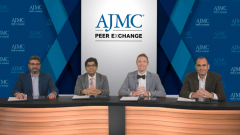
Unmet Needs in Management of Patients With MDS
Unmet needs in MDS treatment management are proposed by Salman Fazal, MD.
Episodes in this series

Ryan Haumschild, PharmD, MS, MBA: Dr Fazal, because you’re a leading clinician in this space and have utilized a lot of these therapies, I want to hear your perspective. What are your thoughts on the unmet needs in the management of myelodysplastic syndrome [MDS]?
Salman Fazal, MD: In terms unmet needs, you can think about the population with low-risk MDS. We have a few therapies that we can offer them. Unfortunately, once the patients fail a certain therapy, we don’t have a very effective second-line therapy. The same could be said about a patient with 5q-. For those patients, we have effective therapy with lenalidomide. But if the patient failed lenalidomide, there isn’t effective second-line therapy. There are a lot for patients with low-risk MDS, and we don’t have effective second-line therapy for them. We also have to use therapies that improve quality of life for patients with low-risk MDS.
For patients with high-risk MDS, we have a bigger challenge. Those patients have poor survival. Unfortunately, apart from hypomethylating agents, we don’t have a very effective therapy for high-risk myelodysplastic syndrome, and 30% to 40% of patients don’t respond or couldn’t tolerate a hypomethylating agent. Unfortunately, a group of patients have high-risk MDS. If they don’t tolerate or respond to a hypomethylating agent, we don’t have an effective second-line therapy for them.
Lastly, as a transplant physician, I’ll mention that for patients who go for transplant, we unfortunately don’t have a very effective therapy for taking them to transplant. We rely on hypomethylating agents. However, the No. 1 reason the transplant fails in myelodysplastic syndrome is disease relapse, because they’re going into the transplant with stable disease. That’s one of the bigger challenges. We need effective therapy before taking them to transplant so that their risk of relapse is lower, whether there’s an effective maintenance therapy or a better therapy before moving into transplant. There are challenges, and that has been the subject of many clinical trials. There are a lot of promising data for different agents. TP53 MDS is another disease that has been a more challenging aspect in terms of MDS, in which we need effective therapy for these patients.
Ryan Haumschild, PharmD, MS, MBA: Well said. Nothing scares a payer more than when you say they go to transplant and all of a sudden relapse. I saw Dr Weaver getting a little nervous, just because you think of the total cost of care. It’s about the patient, but when we don’t have great outcomes in these patients, it affects everybody. Those are the unique challenges. I appreciate you giving that context.
Transcript edited for clarity.
Newsletter
Stay ahead of policy, cost, and value—subscribe to AJMC for expert insights at the intersection of clinical care and health economics.










